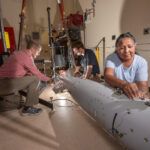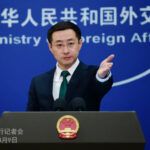North Korean ballistic missile tests are very standard. Say WHAT?
By Thomas Gaulkin, John Krzyzaniak | October 23, 2019
When Donald Trump rocked the nuclear non-proliferation boat in May 2018 by announcing US withdrawal from the Joint Comprehensive Plan of Action—a hard-won agreement widely seen as a successful restraint on Iran’s nuclear program—it marked a major shift in American foreign policy. One month later in Singapore, Trump became the first US president to meet a North Korean leader, reversing decades of strategy aimed at isolating and containing that nation’s military ambitions.
Since then, both Iran and North Korea have tested ballistic missiles. But while Iran’s activities draw unyielding scorn from the White House, North Korea’s sometimes yield little more than a shrug.
For the latest installment of Say WHAT?—the Bulletin’s video series that takes a clear-eyed look at fuzzy policy—we turn to non-proliferation expert Alexandra Bell to explain the dangerous consequences of the Trump administration’s inconsistent nuclear relations. Watch it now.
Together, we make the world safer.
The Bulletin elevates expert voices above the noise. But as an independent nonprofit organization, our operations depend on the support of readers like you. Help us continue to deliver quality journalism that holds leaders accountable. Your support of our work at any level is important. In return, we promise our coverage will be understandable, influential, vigilant, solution-oriented, and fair-minded. Together we can make a difference.
Topics: Nuclear Risk, Nuclear Weapons, Say What?
Thomas Gaulkin
Thomas Gaulkin is multimedia editor at the Bulletin of the Atomic Scientists. Prior to joining the Bulletin in 2018, he spent the... Read More
John Krzyzaniak
John Krzyzaniak is a research analyst at the International Institute for Strategic Studies and a member of the Center for Strategic and International... Read More

















We must avoid looking at these questions from one side. The DPRK faces an existential threat from the US, and by extension forces within its allies. They have witnessed the unapologetic use of nuclear bombs on their neighbor, Japan. Likewise nearly a thousand US bases, some with nuclear capability, are strategically placed around the world. DPRK has no troops outside of its country; the Chinese left in the 1950s, but the US is still provocatively in South Korea. On top of that, impoverishing boycotts and refusal to sign a peace treaty are causes for desperate defensive measures a poor country… Read more »